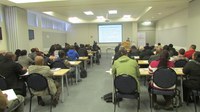Report argues housing ‘queue’ is a myth
The dominant discourse around housing delivery in South Africa is that there is a ‘waiting list system’ which constitutes a housing ‘queue’, and that people must patiently wait until their name comes up in terms of a rational and fair process. Any perversion of this is referred to as ‘jumping the queue’, and the term is consistently evoked by politicians and government officials.
Over the years, national, provincial and local government have developed hi-tech ways of capturing housing demand and allocating supply. However, underneath the numerous policies, systems, tools, databases and processes in place lies a far more complicated and messy reality. The terrain is characterised by myths, misinformation and confusion which have in the past led to community protests, xenophobic violence, ‘illegal’ occupation of state-subsidised houses, court cases and corruption.
The report launched today argues that the ‘the waiting list’ and ‘the queue’ should be eradicated from public discourse on housing. What is needed is a more nuanced way of characterising the rational, appropriate and humane responses to the broad range of housing needs in South Africa, which are not currently catered for by the market.
According to Kate Tissington, senior researcher at the Socio-Economic Rights Institute of SA (SERI), “despite the construction of over a million state-subsidised houses since 1994, South Africa faces a housing crisis. Millions of people live in informal settlements, inner city ‘bad buildings’, backyard shacks and overcrowded family houses. The delivery of houses to poor households is an important political draw card, forming part of the post-apartheid project to redress the socio-economic injustices of apartheid. Politicians and officials responsible for housing, at all levels of the state, have sought to create the impression that housing allocation is a rational process, which prioritises those in the greatest need, and those who have been waiting for a subsidised house the longest. The ideologically and emotionally charged concept of ‘the waiting list’ is emblematic of this.”
The report argues that there is no ‘waiting list’, whether one conceives of it as a mechanism which simply allocates housing to those who have waited the longest, or as a slightly more complicated device meant to take special needs and/or geographical location into account. Instead there are a range of highly differentiated, and sometimes contradictory, policies and systems in place to respond to housing need. These range from centralised housing demand databases and needs registers; lottery systems, which allocate housing to qualifying beneficiaries by chance; and other, highly localised, idiosyncratic and often community-based methods of allocating housing developed to adapt to local situations.
Beyond this there are new housing policies which appear to contradict the logic of a waiting list altogether, including the emergency housing programme, the upgrading of informal settlements programme, and the social housing programme. There are also various unofficial, and often illegal, mechanisms at play. In the first place, there is a great deal of corruption in the allocation of housing, with thousands of public servants managing to get themselves allocated state-subsidised houses. Secondly, people who would otherwise qualify for state-subsidised housing often take occupation of houses without them being ‘officially’ allocated. This category includes overtly political ‘invasions’ of housing, as well as less formal processes which might involve payment of a bribe, or might just reflect administrative error. Thirdly because of the way the Housing Subsidy System (HSS) functions, it may be that there are people recorded as having qualified for and been allocated a house, who have not been given one. Fourth, even after a house has been allocated, it may be sold or informally transferred by poor beneficiaries in need of ready cash and/or wanting to live closer to economic opportunities elsewhere in the country, or within an urban area.
According to Ebenezer Durojaye, senior researcher at the Community Law Centre (CLC), “what is needed in response to all of this is an acceptance that housing allocation is not a simple queue-bound process, and that the housing waiting list and ‘the queue’ are myths. For too long, this kind of language - invoked by government officials, politicians and courts - has been used as a means to shut down any other avenues being pursued by people to gain access to land and housing. We need to start talking more honestly and openly about what is really going on around housing in South Africa, with a view to ensure the progressive realization of the right to adequate housing for all.”
Download the executive summary here and the report here.
Contact details:
Kate Tissington, Senior Researcher and Advocacy Officer, Socio-Economic Rights Institute of South Africa (SERI): 011 356 5862 / 072 220 9125 / kate@seri-sa.org
Ebenezer Durojaye, Project Head and Senior Researcher, Socio-Economic Rights Project, Community Law Centre (CLC): 021 959 3704 / 084 577 0757 / edurojaye@uwc.ac.za
This project is funded by the Foundation for Human Rights (FHR) and the Ford Foundation.

